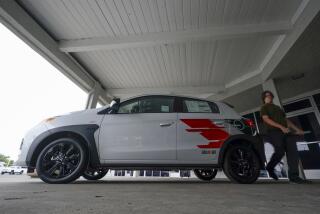Mazda Puts Brakes on Amati : The Car Maker Cancels Plans to Launch a Luxury Car Division
- Share via
IRVINE — Bowing to economic pressure, Mazda Motors of America said Monday that it is canceling plans to launch its Amati luxury car division in the United States.
The decision was based on growing concerns about competition from other luxury brands in the midst of a worldwide recession, Mazda officials said. Plans for the proposed line of upscale cars in other parts of the world were unclear.
Mazda officials had already signed initial agreements with 67 prospective Amati dealers in the United States. All were notified Friday of the program’s cancellation. Mazda officials said none of the dealer candidates will lose money because they had not started building their facilities.
The Amati was to have been significantly different from other Mazda models in design--much as Cadillac differs from Buick and Oldsmobile. The cars were expected to be sold for between $35,000 and $45,000 through a separate network of Amati dealers.
Mazda was criticized by some in the automobile industry in 1991 when it announced its decision to start the Amati division, which would have competed with Nissan’s Infiniti, Toyota’s Lexus, Mercedes-Benz and such U.S.-made cars as the Lincoln Continental and Cadillac STS. Analysts and competitors questioned whether Mazda--Japan’s No. 4 car maker--could successfully compete in a shrinking U.S. market.
Since then, car sales in the United States have dropped another 15%, although sales of several luxury models, including Lexus, Infiniti and BMW, are up substantially this year compared to the first nine months of 1991.
At Mazda, U.S. sales for the first nine months are off 2.2% to a total of 262,000 cars and trucks.
At competitor Mitsubishi Motors Sales of America, officials decided several years ago not to form a separate unit to market their company’s upscale Diamante luxury car in the United States, saying that they saw no gain in dividing consumers’ attention and corporate marketing dollars among several nameplates.
Monday’s announcement by Mazda was “an inevitable business decision in today’s automotive climate, and it will prove to be a good one for Mazda and Mazda’s dealers,” said Richard Lepley, senior vice president of sales and marketing at Mitsubishi’s Cypress headquarters.
Douglas Kevorkian, an auto industry analyst with J.D. Power & Associates in Agoura Hills, called Mazda’s decision “probably a sound one, given the terrible economy in Japan and the U.S.”
He said he does not believe that Mazda’s Amati could have caught up with Lexus or Infiniti, especially after the costs incurred in the last year’s U.S. launch of five new Mazda vehicles--one of the largest one-year product launches in U.S. automotive history. “That has got to have stripped their coffers,” Kevorkian said.
Mazda had intended to aim the Amati at U.S. consumers with annual incomes of $75,000 or more, and in January awarded a $75-million Amati advertising campaign to the Los Angeles office of Lord Dentsu & Partners. The new cars had been under development for several years when the company made its August, 1991, announcement that it would create the new division and introduce the cars in the United States in 1994.
In the last 14 months, Mazda Motors of America has leased offices for the Amati division near its corporate headquarters in Irvine and has hired between 35 and 50 people to staff the unit.
Their fate still is uncertain, said Jay Amestoy, spokesman for Mazda Motors of America.
Mazda Motors of America employs about 880 in Irvine, including those at Amati.
Amati officials could not be reached for comment Monday; telephones in the division’s offices rang unanswered during the afternoon.
Mazda Motor Corp., based in Hiroshima, apparently has found itself in a cash crunch. Late last week it announced in Japan that it was canceling its sponsorship of the Mazda Japan Golf Tournament and withdrawing company sponsorship of Le Mans and IMSA auto racing programs.
Mazda has spent a tremendous amount of money expanding its distribution network in Japan and launching new products in markets around the world, said George Peterson, president of AutoPacific Group, a Santa Ana consulting company.
“You can do this in a good market, but when you have recession in most of the major markets it creates significant stresses.”





